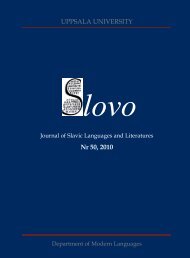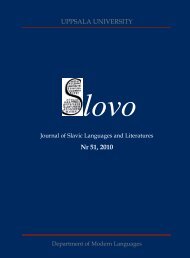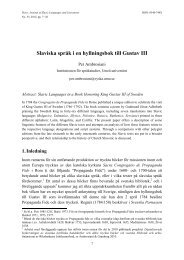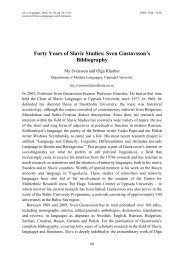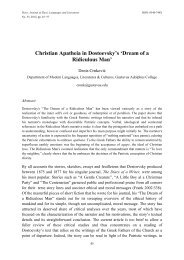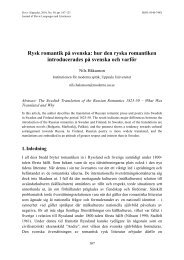Full text PDF - Index of - Uppsala universitet
Full text PDF - Index of - Uppsala universitet
Full text PDF - Index of - Uppsala universitet
Create successful ePaper yourself
Turn your PDF publications into a flip-book with our unique Google optimized e-Paper software.
Slovo.<br />
Journal <strong>of</strong> Slavic Languages and Literatures<br />
The SOT parameter distinguishes Germanic (and Romance) languages from Slavic<br />
languages. The former, unlike the latter, may exhibit tense agreement between the<br />
tense <strong>of</strong> the matrix (auxiliary) and the tense morphology <strong>of</strong> the embedded verb forms,<br />
as we see for English in Figure 1. Interestingly, the parameter enables us not only to<br />
derive the traditional SOT data from attitude con<strong>text</strong>s (with matrix speech verbs,<br />
factive verbs and perception verbs) (Grønn & von Stechow 2010), but also some<br />
intriguing agreement phenomena in adjunct tenses (Grønn & von Stechow 2011). In<br />
this respect the non-trivial example below with different translation patterns in<br />
German/Norwegian and English illustrates several relevant points:<br />
(6) Кроме того, никогда не было случая, да и не будет, чтобы Абадонна<br />
появился перед кем-либо преждевременно. (Michail Bulgakov, “Master i<br />
Margarita”)<br />
(7) Besides, there has never yet been, and never will[un] be, an occasion when<br />
Abaddon appears[un] before someone prematurely.<br />
(8) Außerdem ist es noch niemals vorgekommen, und es wird[un] auch niemals<br />
vorkommen, daß Abadonna vorzeitig bei jemand erscheint[un]. 4<br />
(9) Dessuten har det aldri forekommet og vil[un] heller aldri forekomme at<br />
Abadonna viser[un] seg for noen før tiden (Norwegian) (= never will happen<br />
that A appears…)<br />
The German (and Norwegian) translation uses a construction with complement tense,<br />
while the English translator has chosen a temporal adjunct. In both cases, semantic<br />
tense dependency on the matrix verb (“vorkommen”/“be an occasion”) leads to<br />
morphological tense agreement with the finite auxiliary (“wird”/“will”) in the matrix,<br />
as we see in Figure 2.<br />
a. NOW wird vorkommen daß A erscheint (German)<br />
in un (un) un<br />
|_______|_______|______________|<br />
b. NOW never will be an occasion when A appears (English)<br />
in un (un) un<br />
|___________|___|_____________________|<br />
Figure 2. Feature transmission in complement tense (German) and adjunct tense (English).<br />
We assume that verbs like “be an occasion”, “happen” or the German “vorkommen”<br />
are verbal quantifiers (see Section 8 below). The examples above are therefore rather<br />
involved since we have two verbal quantifiers: “be an occasion” (“vorkommen”) and<br />
the future time shifter “will” (“wird”). Since the former is non-infinite it does not have<br />
4 The German translation was retrieved from the parallel corpus Parasol: http://parasol.unibe.ch/.<br />
66



